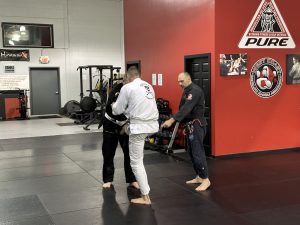White Belt BJJ Mistakes: Not Asking Questions

In Brazilian Jiu-Jitsu (BJJ), not asking questions can indeed hinder your progress, especially as a white belt.
Missed Learning Opportunities
BJJ is complex and requires a deep understanding of techniques, positions, and concepts. If you don’t ask questions when you’re confused or curious, you miss out on valuable learning opportunities.
Clarification
Techniques may seem straightforward when demonstrated by your instructor, but when you try them yourself, you may encounter difficulties or nuances that weren’t immediately apparent. Asking questions helps clarify any confusion and ensures you’re practicing the technique correctly.
Understanding Concepts
BJJ isn’t just about memorizing techniques; it’s about understanding the underlying concepts and principles. By asking questions, you can gain insight into why certain techniques work, how they fit into larger strategies, and how to adapt them to different situations.
Safety
BJJ involves close physical contact and can lead to injuries if techniques are not performed correctly. If you’re unsure about a technique or its application, asking questions can help prevent injuries by ensuring you’re practicing safely.
Engagement
Asking questions shows your instructor that you’re actively engaged and invested in your learning. This can lead to more personalized feedback and guidance tailored to your specific needs and goals.
Building Relationships
BJJ is a community-oriented martial art, and asking questions fosters communication and camaraderie among training partners and instructors. It shows that you’re open to feedback and willing to learn from others, which can strengthen your relationships within the gym.
Final Thoughts
Remember, everyone starts as a white belt and nobody expects you to have all the answers. Asking questions is a sign of humility and a crucial part of the learning process in BJJ. So don’t be afraid to speak up and seek clarification whenever you’re unsure about something.

